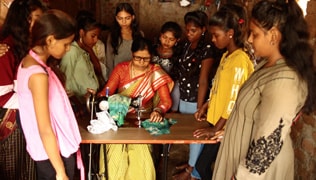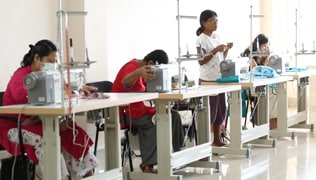- Home/
- Stories
Stories
Threading Hope: Sakuben Ahir's Journey From Challenges To Empowerment
Team NDTV | Friday January 24, 2025From immobility to independence, Sakuben Ahir's journey showcases resilience. Through Usha Silai School, she empowered herself and uplifted her community
- Team NDTV | Thursday January 02, 2025
From stitching in villages to gracing India Style Fashion Week, USHA Silai School women showcase grit and creativity, turning challenges into triumphs as designers on prestigious global platforms
- Team NDTV | Thursday December 26, 2024
From earning ₹10 a day to walking the ramp at Lakm Fashion Week, Sunitas story is a powerful tale of determination, skill, and community empowerment through USHA Silai School
- Team NDTV | Thursday December 26, 2024
Sobiyamari overcame adversity, built a thriving business with USHA Silai School, and empowered women in her village
- Team NDTV | Thursday December 26, 2024
Usha Silai Schools mark a decade of empowering women like Saroj Namdev, who transformed her life through sewing, trained 250+ women, and built a thriving business, inspiring change and self-reliance
- Team NDTV | Wednesday April 24, 2024
By the end of 2022, for every Rs. 100 invested in the training of women, the Usha Silai School generated an average of Rs. 8,300, reported IIT-Delhi study
- Team NDTV | Wednesday January 31, 2024
The partnership between Usha and the Sewaj Neesim Foundation is empowering women and giving old uniforms a new identity, a new purpose, and a new pride
- Team NDTV | Tuesday January 30, 2024
Among the aims and objectives of the CRPF Family Welfare Association is to skill the CRPF wives and give them a sense of accomplishment
- Team NDTV | Friday December 20, 2024
Renowned for its skill development program in sewing and tailoring, Usha's training cum production centre is enabling the wives of Army personnel at the village level to become financially independent
- Team NDTV | Saturday January 27, 2024
Used for both offense and defence, Karra Samu and Kathi Samu are incredibly dynamic and visually captivating martial art forms
Adopt a Silai School
About the Initiative

Kushalta Ke Kadam, an initiative by USHA Silai School and NDTV has entered its eighth season. The aim is to empower more women across rural India by teaching them sewing skills and helping them open new doors of opportunities for themselves. The initiative encourages rural women to become financially independent and entrepreneurs by taking up sewing and training others in their respective communities.
Since 2011, the USHA Silai School initiative has trained more than 12 lakh rural women through over 33,000 Silai schools, spanning over 20,751 villages across India.
The women earn Rs. 4,000 – 5,000 per month on an average, with the highest recorded monthly earning being Rs. 84,000 in a month. This earning works as a catalyst towards building their self-confidence, reducing gender inequities, and raising their stature within their families and in society at large.
In Pics

Rebari girls grow up learning traditional embroidery, which along with their new found sewing skills developed at Usha Silai Schools, is helping them earn a living.

Usha Silai School has empowered many rural women to support their family and send their children to school.

The Usha Silai School, established in a small nondescript village that goes by the name of Kottai, is helping empower people from varied communities.

The all-inclusive Usha Silai School Programme covers the entire nation from hamlets tucked between hills to villages cast by the sea.

Vegetables farmers from the Mizoram hills earn very little given the topography of the area. Usha Silai Schools have played an important part in this region by skilling women to financially contribute towards their households.

Usha Silai School learner Lucy has trained seven other women in her community, helping them to become financially independent.

Women like Kaviben from the nomadic Rebari community are finally laying down their roots as they begin to gain financial independence and thereby stability through Usha Silai School.

Usha Silai School, located in the Gujarat's Bhuj village, is enabling rural women to earn as much as Rs. 2,500-4,000 each month.

Usha Silai School, in association with a Gujarat based NGO called Kala Raksha, is trying to bring about a Silai revolution in Bhuj.

Besides training other women from their community, many Usha Silai School learners have become entrepreneurs in their own right.

With sewing becoming easily accessible and lucrative, the silai schools are also helping revive traditional motifs and designs.












